
BIOLOGICAL INVASIONS
metrics 2024
Shedding light on the challenges of biological invasions.
Introduction
BIOLOGICAL INVASIONS, published by Springer, stands at the forefront of ecological research, providing a vital platform for studies related to invasive species and their impacts on biodiversity and ecosystem dynamics. With an impressive impact factor reflecting its high-quality contributions, this esteemed journal has established itself in the Q1 category in both Ecology and Ecology, Evolution, Behavior and Systematics, highlighting its significance within these fields. The journal is indexed in the renowned Scopus database, ranking 113th out of 721 in Agricultural and Biological Sciences, and 82nd out of 461 in Environmental Science, affirming its importance and reach among ecological research. Since its inception in 1999, BIOLOGICAL INVASIONS has published cutting-edge research, fostering a deeper understanding of the dynamics of species invasions and their ecological consequences. While it does not currently offer Open Access, researchers, professionals, and students will find invaluable insights and the latest advancements in biodiversity conservation, ecosystem management, and invasion biology within its pages. This journal serves as an essential resource for those committed to addressing the challenges posed by biological invasions, making it a cornerstone in ecological literature.
Metrics 2024
 0.94
0.94 2.80
2.80 3.10
3.10 130
130Metrics History
Rank 2024
Scopus
IF (Web Of Science)
JCI (Web Of Science)
Quartile History
Similar Journals
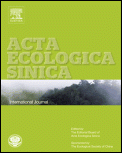
Acta Ecologica Sinica
Illuminating ecological challenges through rigorous research.Acta Ecologica Sinica, published by Elsevier, is a prominent journal in the field of ecology, with a strong focus on fostering understanding in ecological principles and their applications. Established in China, this journal holds an impressive Q2 categorization in both Ecology and Ecology, Evolution, Behavior and Systematics as of 2023, positioning it within the top tier of ecological research. With its Scopus rankings placing it in the 81st and 78th percentiles in relevant ecological domains, it serves as a vital platform for researchers and practitioners to disseminate findings that promote ecological sustainability. Although it operates under a traditional access model, its significant impact is underscored by its systematic convergence of key ecological inquiries across multiple years (2006-2008, 2014, 2017-2023). By engaging with the latest empirical studies, theoretical advancements, and methodological innovations, Acta Ecologica Sinica is indispensable for scholars dedicated to advancing ecological knowledge and addressing environmental challenges.

WETLANDS ECOLOGY AND MANAGEMENT
Navigating the complexities of wetland ecosystems for better management.Wetlands Ecology and Management, published by Springer, is an esteemed journal that has been advancing the field of wetland studies since its inception in 1982. Operating under the ISSN 0923-4861 and E-ISSN 1572-9834, this journal is headquartered in the Netherlands and serves as a critical resource for researchers, professionals, and students alike. It fosters interdisciplinary dialogue among aquatic science, ecology, and resource management disciplines, ranking in the Q2 category for Aquatic Science and Ecology, Evolution, Behavior and Systematics as of 2023. With a notable Scopus ranking, it is positioned favorably within the 65th percentile in Ecology and a commendable 58th percentile in Aquatic Sciences. The journal emphasizes the importance of effective management strategies and policies in the conservation of wetlands, making it indispensable for those aiming to drive impactful research. Although it is not an open-access journal, its high-quality publications remain accessible through library consortia and institutional subscriptions, ensuring that pertinent insights into the ecological dynamics and sustainable management practices are available to the global research community.

RUSSIAN JOURNAL OF ECOLOGY
Advancing Knowledge in Ecological Research and InnovationRUSSIAN JOURNAL OF ECOLOGY, published by PLEIADES PUBLISHING INC, stands as a critical resource within the field of ecology, offering an array of research insights that span various ecological topics. With an ISSN of 1067-4136 and an E-ISSN of 1608-3334, this journal has been consistently disseminating knowledge since its inception in 1996, now converging towards 2024. Despite its current Q4 ranking in the Ecology, Evolution, Behavior and Systematics category, the journal has carved out a niche in the publication landscape, particularly for scholars focused on the rich and diverse ecological phenomena of Russia and surrounding territories. The journal aims to foster interdisciplinary collaboration and innovation by providing a platform for the dissemination of high-quality research. While it currently lacks open access options, readers can expect in-depth studies and analytical discourses that contribute meaningfully to the global understanding of ecological systems. With an impressive Scopus rank, this journal remains an important outlet for researchers, professionals, and students committed to advancing ecological science.
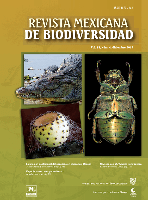
Revista Mexicana de Biodiversidad
Pioneering Research for a Greener TomorrowRevista Mexicana de Biodiversidad is a prominent academic journal dedicated to the field of biodiversity and conservation, published by the prestigious Instituto de Biología, Universidad Nacional Autónoma de México. Since its inception as an Open Access publication in 2005, it has aimed to disseminate high-quality research that advances the understanding of biological diversity in Mexico and beyond. With an ISSN of 1870-3453 and an E-ISSN of 2007-8706, the journal caters to a diverse audience, including researchers, professionals, and students, by providing vital insights into ecological studies, conservation strategies, and the sustainable management of natural resources. The journal is committed to fostering scientific collaboration and promoting the significance of biodiversity in addressing contemporary environmental challenges. By publishing innovative and impactful research, the Revista Mexicana de Biodiversidad plays an essential role in the global discourse on biodiversity conservation.

Folia Oecologica
Connecting Global Scholars in Ecological Studies.Folia Oecologica is a distinguished open-access journal published by WALTER DE GRUYTER GMBH, focusing on critical research in the fields of agricultural and biological sciences, ecology, and forestry. Established as a vital platform for the dissemination of knowledge, this journal has been providing free access to its valuable content since 2017, catering to an international audience engaged in environmental and ecological studies. With its ISSN 1336-5266 and E-ISSN 1338-7014, Folia Oecologica has earned notable ranks in Scopus, placing it in the 62nd percentile for Agricultural and Biological Sciences and the 50th percentile for Environmental Science. The journal's commitment to high-quality research is reflected in its positions in the Q2 and Q3 quartiles across various categories in 2023. As it converges years from 2006 to 2024, Folia Oecologica continues to foster scholarly dialogue and collaboration among researchers, professionals, and students, making significant contributions to the understanding and preservation of our ecological systems.
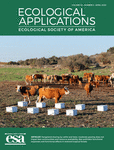
ECOLOGICAL APPLICATIONS
Shaping ecological policies through rigorous scholarship.ECOLOGICAL APPLICATIONS, published by WILEY, is a leading journal in the field of ecology, providing a platform for innovative research that addresses the understanding and management of ecological systems. With an ISSN of 1051-0761 and E-ISSN of 1939-5582, it has established itself as a vital resource for ecologists and environmental scientists since its inception in 1991. Ranked in the top quartile (Q1) for Ecology in 2023 and with a Scopus ranking of 40 out of 461 in Environmental Science, ECOLOGICAL APPLICATIONS boasts an impressive impact factor, attesting to its significance and influence in the field. The journal's mission is to publish peer-reviewed articles that contribute to ecological theory and its applications in conservation and environmental management. Researchers, professionals, and students alike will find invaluable insights and the latest developments in ecological research through its comprehensive scope and rigorous scholarship, ensuring a crucial role in shaping future ecological practices and policies.

ECOLOGICAL RESEARCH
Pioneering insights that drive ecological practices and policies.ECOLOGICAL RESEARCH is a prestigious academic journal published by WILEY, dedicated to advancing the field of ecology and its associated disciplines. Since its inception in 1986, the journal has consistently provided a platform for high-quality, peer-reviewed research, contributing significantly to the understanding of ecological systems and their complexities. With an impressive 2023 impact factor reflected in its Q1 ranking in the category of Ecology, Evolution, Behavior, and Systematics, it stands among the top journals in its field, as evidenced by its Scopus rank of #192 out of 721 and placement in the 73rd percentile. While accessible through standard subscription models, this journal plays an essential role in disseminating crucial findings and innovative methodologies to researchers, professionals, and students alike. With a commitment to fostering ecological knowledge and collaboration, ECOLOGICAL RESEARCH continues to influence ecological practices and policies, shaping the future of research in this critical area.

Russian Journal of Biological Invasions
Navigating the intricacies of invasive species dynamics.Russian Journal of Biological Invasions, published by PLEIADES PUBLISHING INC, is a pioneering periodical dedicated to advancing the understanding of biological invasions in diverse ecological contexts. With an ISSN of 2075-1117 and an E-ISSN of 2075-1125, the journal primarily serves the scientific community in the fields of ecology, evolution, behavior, and systematics, boasting a respectable Q3 categorization in Ecology for 2023 and ranking 559 out of 721 in its domain in Scopus. The journal's coverage spans from 2010 to 2024, addressing critical issues such as the ecological impacts of invasive species and offering insights into management strategies. Though not an Open Access journal, it provides invaluable resources for researchers, professionals, and students keen on tackling the challenges posed by biological invasions. Its contributions significantly enrich the discourse in ecological research and conservation efforts, making it an essential resource for those seeking to comprehend and mitigate the effects of invasive species on ecosystems across the globe.
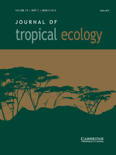
JOURNAL OF TROPICAL ECOLOGY
Advancing Knowledge for a Sustainable FutureThe JOURNAL OF TROPICAL ECOLOGY, published by Cambridge University Press, serves as a pivotal platform for advancing knowledge in the field of ecology, particularly within tropical environments. With an ISSN of 0266-4674 and an E-ISSN of 1469-7831, this esteemed journal has been a key resource since its inception in 1985, maintaining a focus on empirical research that addresses the complexities of tropical ecosystems. It holds a respectable Q3 ranking in the Ecology, Evolution, Behavior and Systematics category as of 2023, indicating its significant contribution to the field, although it remains within the competitive mid-range. The journal publishes original research, reviews, and methodological articles that illuminate the rich biodiversity and unique ecological processes of tropical regions, fostering a deeper understanding of conservation challenges. Accessible from the United Kingdom, this publication appeals to a diverse audience of researchers, professionals, and students keen on exploring ecological dynamics in tropical settings, and plays a crucial role in promoting scientific discourse and collaborative efforts aimed at preserving our planet's vital ecosystems.
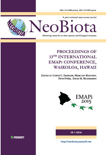
NeoBiota
Connecting researchers to the pulse of biodiversity science.NeoBiota, published by Pensoft Publishers in Bulgaria, is a preeminent Open Access journal dedicated to advancing knowledge in biodiversity, ecology, and conservation science. Since its inception in 2011, it has established itself as a pivotal platform for scholarly discourse, maintaining an impressive impact factor that places it in the Q1 quartile across multiple categories, including Animal Science and Zoology, Aquatic Science, and Ecology. With its articles indexed in leading databases and Scopus rankings that affirm its standing (e.g., rank #12 in Animal Science and Zoology), NeoBiota serves as a vital resource for researchers, professionals, and students. The journal emphasizes the synthesis of ecological modeling and evolutionary processes, fostering interdisciplinary collaboration and promoting rigorous research methodologies. Authors are encouraged to contribute their insights on biodiversity metrics, ecosystem dynamics, and the ecological implications of anthropogenic changes, making NeoBiota essential for anyone invested in the future of our planet's ecosystems. Discover the treasures of ecological scholarship through this influential journal.